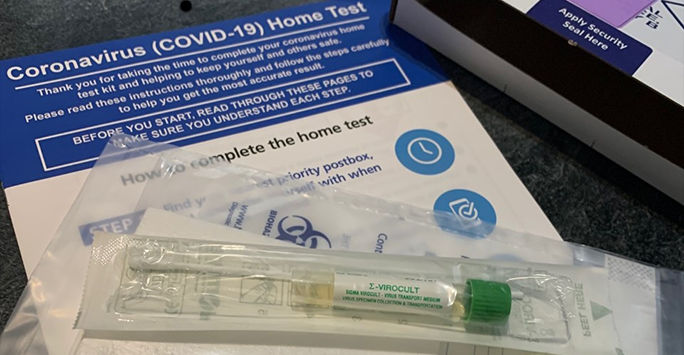
Dr Richard Latten, Deputy Director of Wellbeing, shares how signing up for his first ever clinical trial injected some much-appreciated positivity, proof that giving to others truly is one step to wellbeing.
"The card’s message is a simple ‘Thank You’ yet warms my heart. It’s from the trial team at the Liverpool School of Tropical Medicine who’ve been co-ordinating the Oxford COVID-19 vaccine clinical trial here in Merseyside.
Back in the pandemic first wave, like so many others, I strove to adapt to the rapidly changing situation as the coronavirus’ malign spread started to affect our lives. I reduced my university role to increase working alongside my palliative care colleagues in hospital, providing symptom control support. Sadly, we were often needed. I’m proud to work within a great team and the camaraderie and connections of working alongside my colleagues was hugely supportive.
As the first wave thankfully started to ebb away, my own wellbeing reserves were low.
The adrenaline sustaining me during those difficult early weeks faded and I was exhausted. In my wellbeing support role, I’m well aware of strategies to maintain self-care such as the five ways to wellbeing: Connect, Be Active, Keep Learning, Take Notice and Give to others. But putting them into practice is another story, particularly with the pandemic impacting some of our usual wellbeing activities.
With the first wave still fresh in my mind, the prospect of participating in the vaccine trial arose. They were seeking healthcare professionals to participate in the phase two/three clinical trial for the Oxford/AstraZeneca vaccine. Having recently seen with my own eyes the tragic impact of the virus on people’s lives; I felt motivated to help in any way possible. So for the first time in my life, I volunteered for a clinical trial.
Looking back over seven months and counting of being a trial participant, it’s an experience that will stay with me for the rest of my life.
It started with a first return since lockdown to the University campus for the screening clinic to check my eligibility for the trial. It felt strange to walk past Cedar House with the streets so very empty. I wasn’t alone in volunteering; many fellow professionals had responded to the call. All of us following a well organised socially distanced route through the process of recruitment into the trial.

A home COVID-19 test kit
A few days later I was back on campus, this time with a needle poised over my arm. I’ll admit to feeling nervous, but the calm, professional and kind approach from the research staff helped immeasurably. I didn’t know whether I was about to receive the trial COVID-19 vaccine or the control meningitis vaccine. Either way it felt significant as my trial journey began.
And as weeks became months, my participation in the trial continued alongside my clinical and university roles. Every Tuesday began with the ritual of the weekly PCR (polymerase chain reaction) swab. I especially don’t like the throat swabs and gag every time, but do my duty and each negative result brings reassurance.
In December, news of effective vaccines brought a glimmer of hope amongst the darkness of the virus re-escalation. Like many others, I voraciously read any news of vaccine developments, feeling a particular connection to the Oxford vaccine.
As the NHS vaccination programme commenced, the trial arranged for participant ‘un-blinding’ if offered another vaccine and, by coincidence, the same day the vaccine received UK approval, I found out I’d received the COVID-19 vaccine in the trial.
I felt overwhelmed with emotion.
I knew that whichever one I’d received I was helping but felt grateful to have received the actual vaccine. Now that I know, it doesn’t change how I act. I still maintain the adherence to social distancing, hand hygiene and PPE, which prevented me contracting the virus in the first wave.
Volunteering for the trial has benefited my mental wellbeing during these difficult times. The feeling of helping others and contributing in a small way to escaping this terrible pandemic has given me an increased sense of connection and purpose. I experience a wellbeing boost each time I hear people are receiving the vaccine.
My experience taught me that the theory of the five ways to wellbeing can work in practice, even during a pandemic. It’s all about finding an approach that works for you. If contributing to COVID-19 related research sounds like something that might work for you, there are still opportunities. Take a look on the NHS website for more details.
These remain difficult complex times and all of us need help on occasion. Remember we’re here in the wellbeing team if you need us."
Discover more
- Visit the wellbeing support page on the School of Medicine Student Intranet
- Follow the School of Medicine on Facebook, Twitter and Instagram